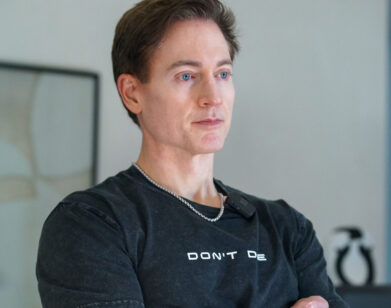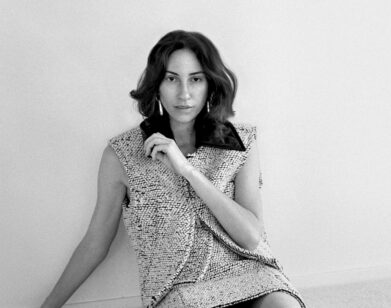Binge
Please Enjoy as Sienna Miller and Rupert Friend Take the Piss
“Things are different now,” contends Anatomy of a Scandal, Netflix’s latest political drama. Gone, it argues, are the days when accusations of sexual assault and workplace trysts could be brushed under the rug. Instead, Anatomy of a Scandal, which stars Rupert Friend and Sienna Miller, positions itself as a post-Me Too commentary on the men who commit such acts—and more importantly, on the women who are pulled into their spiraling orbits. When James Whitehouse (Friend), a dashing British minister, is accused of assault, his wife (Miller) is left to pick up the pieces. To learn more about the series, and the relationship at the heart of it, we reunited Friend and Miller—practically an old married couple themselves—for a conversation about making friends, the joy of entering your 40s, and Toyota Siennas. —SOPHIE LEE
———
FRIEND: Hi, Sienna.
MILLER: Hi Rupee-roo.
FRIEND: My first question for you is: What is your favorite color?
MILLER: Green.
FRIEND: My second question is: How do you learn all those lines?
MILLER: [Laughs] I feel like I’m better equipped to answer that than you because I actually learn my lines. It’s called being able to focus, and read, and go home, and not eat a gourmet meal. Honestly, I’ll answer that question. I read the line and I write it down without looking at it, and it’s a very quick way for me to learn those lines.
FRIEND: Oh, wow. So you actually say the ones that are written down on the script?
MILLER: Unlike you, I actually try to learn what the writer has written, and then I turn up to work and I say what has been written down. I don’t fudge it and make up my own things. I know it’s something that you have struggled with.
FRIEND: Can we do Anatomy of a Scandal again, and I can take all this information that you’ve taught me and apply it?
MILLER: I don’t know that I’m up for that, having made it already in the way that I intended to, but we can do something else, and I’ll even run lines with you before we start shooting.
FRIEND: My next question, are you named after the Toyota minivan?
MILLER: [Laughs] I was actually conceived in a Toyota Sienna and it was a toss up between “Toyota” or “Sienna.” Mum thought that if you abbreviated “Toyota” to “Toy,” which might sound a bit kinky so she went with Sienna. But it was close.
FRIEND: I wanted to ask you an actual question, and it’s about friends, because I realized that I think I’ve made, on the whole, probably more deep and lasting friendships in my later years than in my earlier years. I know you’re a very popular young lady, and you have friends from all over the place, and from when you were a little girl. I think I made friends on our show that I will always have, and I’m not sure if I was younger if I would have been able to do that.
MILLER: I think we would have won you ‘round, because it’s a sense of humor thing isn’t it? Unless you weren’t as irreverent as you are now.
FRIEND: I was very dull and uninteresting.
MILLER: Very boring, yeah. What can I say? I have best friends from, really since grade school. The first decade of my life, I think I was a bit over enthusiastic, a bit much. I feel like that part of me is toned down.
FRIEND: You don’t think you’re a bit much anymore?
MILLER: No.
FRIEND: What amount do you think you are? Just enough?
MILLER: I think enough, with occasional bouts of extra. More to love, as they say. You’d like me more if I was just a bit less?
FRIEND: I would find you more tolerable, yeah.
MILLER: I think you quite like how much more I can be, because you seem to match. You’re very interesting in that way. You will rise to the energy of a space or a person. You’re a bit of a chameleon, or what’s the word?
FRIEND: A dominating, domineering, egomaniacal, mansplaining bully?
MILLER: Yes, that too.
FRIEND: Sienna, you’re known as being very well read. What’s on your nightstand?
MILLER: Thanks for asking. I’m reading a book called The Waterworks by E.L. Doctorow.
FRIEND: About crying?
MILLER: It’s about weeing, actually.
FRIEND: You’re reading a book about weeing?
MILLER: No, it’s a really great mystery book that was written in the 1990s, but it’s set in the 1800s, and I’m about seven chapters in and I’m really enjoying it. I have just finished another one called Bonjour Tristesse, Hello Sadness, by Françoise Sagan, which is phenomenal.
FRIEND: Have you ever wanted to write a book yourself?
MILLER: No, I don’t have the attention span. I like the idea of being able to write a script. I can compose a good letter, I like to think, but I don’t have the patience right now, or the time, quite frankly.
FRIEND: And if you were to do it, what would you write a book about?
MILLER: I would write a book about relationships between people. That’s all that I really care about—love, things like that, you know? No one’s done it, so uncharted territory for a novel.
FRIEND: So, I’ve got a great friend whose name is Marlowe [Sturridge, Miller’s daughter], and she’s a real friend. She supports pretty much everything I do. She calls. She invites me to things, and she remembers my birthday. And I know she saw Anatomy of a Scandal, which is an interesting parenting choice, being that my friend Marlowe is about eight or nine.
MILLER: We fast forwarded bits, I hasten to add, before I get social services bashing on the door.
FRIEND: Okay, so she had to watch the sexual scenes in fast forward, which I’m sure scarred them even further into her brain. She was definitely a fan of my character, right?
MILLER: She was, and at seminal moments where people might not be rooting for you. When things might go your way, there was some cheering from Marlowe.
FRIEND: Cheering from some of my friends, and I’ve not got many so I need to recognize it when it happens.
MILLER: Yes, your bond with my child is something to behold. It was really quite magical, because you really got her, which I loved.
FRIEND: Well, I think she might might be a genius, and you know I don’t like to use that word about myself, but it’s just something that—
MILLER: You recognize.
FRIEND: I’ve heard it said. People can think what they like. I’m just trying to live a normal, humble life and I think that Marlowe and I see that in each other. There’s an idiosyncrasy that, and again, I don’t use the word genius…
MILLER: It’s out of my reach for sure.
FRIEND: Yeah, and I think she said, “Imagine, having been born to that idiot,” and I said, “I can’t imagine it.” We were off to the races in a way.
MILLER: She and you are extremely close, closer than you and I actually.
FRIEND: So, you and I both recently turned 30. How is this new, bright, shiny decade feeling for you?
MILLER: I don’t know that I’ve ever felt better in myself than I do, and it’s either coincidental, or there is something in the old adage that says “life begins at 30.” I honestly feel like I wouldn’t trade the shiny skin, or, I wouldn’t go back. I like the sense of being settled.
FRIEND: You like having slightly more scaly skin?
MILLER: Scaly, lizard-like skin and larger pores.
FRIEND: You know, the skin doesn’t snap back.
MILLER: The elasticity is going, but in its place is the little sprigs of wisdom, and the feeling of, I don’t know if it’s nihilism or I genuinely just don’t really give a fuck anymore, but I don’t really give a fuck about anybody’s opinion, anybody’s judgment. I think the 30s, as a woman, the headlines are so loud of “must procreate.”. Then, when you get to 30, or 40 if we’re being honest, there’s a sort of a vast expanse unfolding that I couldn’t see.
FRIEND: A vast expanse of…
MILLER: Possibilities. I’m gonna go deep into metaphor here, because why not? I felt quite in the woods in the 30s, and I’ve just come out into a very large clearing. I feel a sense of space, and excitement, and less noise in my head. It might be the deterioration of the brain—that does tend to start.
FRIEND: Too many white wine coolers.
MILLER: I didn’t have my Weetabix, exactly.
FRIEND: Well that’s good to hear. I remember when I was a kid and my parents turned 40 and that was sort of the end, right? That was like, “Well, you did it. You’ve done life now and that’s the end.” Now, I feel like there are friends I have, who are in their 60s, who are fitter than I am, doing more adventurous things than I am, and who are sort of blazing a trail for us. Frankly, the friends I have who are in their 20s, they’re the ones who are like, “I’m tired.”
MILLER: Much more grown up than we are.
FRIEND: Yeah, they’ve grown up but I think they’re lazier. They’re all idiots.
MILLER: They’re hot and lazy.
FRIEND: Somehow they’re sweaty without doing anything, which is annoying, and they sit around and make noxious smells. I’m not going to be friends with them anymore.
MILLER: You and I are both quite like this, where we’ve got best friends in their 70s.
FRIEND: For sure.
MILLER: I’m not that concerned with age, because I feel about 18, and behave accordingly. As a woman, on an aesthetic level, or on the purely superficial level, I look above me and I see J.Lo in her 50s and think, “Well, she looks better than anyone.” I met Sharon Stone, and she said, “You’re so lucky that you’re 40 at this moment in time, because when I turned 40 that was it. It was oblivion. Your career was over.” It was the wilderness for female actors, and now acting has expanded to include women of all ages and it’s very glamorous to get older, and the words “anti-aging” are kind of sinful now. There’s so much to embrace about getting older. I’m into it.
FRIEND: I think it’s really cool, and when you look at cultures that everyone turns to for proper wisdom, ancient cultures, they all revere people as they get older, because they have more wisdom, more serenity, all the things you described, rather than what we traditionally in the West have done, which is stick them in a home with a soft biscuit and a lukewarm cup of tea to rot.
MILLER: At 40?
FRIEND: Yes, that’s what I understood was going to happen to us. So when it didn’t, I was quite relieved.
MILLER: Can we both go to that old age home, where actors go to die? Denby Hall?
FRIEND: I don’t know, but I love it.
MILLER: There is a place in England in Albion where we go as actors to die.
FRIEND: Oh, brilliant. Let’s go there now for a bit, put a rug on our knees, stare out at the sea, and complain about our joints.
MILLER: I think Marianne Faithfull just moved in there. I’ve got the name wrong but I’m sure we can find it.
FRIEND: That sounds great. I think it’s gonna be fun.
FRIEND: What do you think about theater?
MILLER: It’s my favorite. You and I have talked about this.
FRIEND: Did we? What did we say?
MILLER: I told you that somebody I know very well had wanted you to be in what ended up being an extremely successful, Tony-nominated play and you hadn’t heard about that. And you haven’t done plays and weren’t that enthusiastic about the idea of doing them, and I thought that you’d be brilliant and was pitching the idea of doing a play, because I thought we could do some restoration comedy and smash it, you in a wig with white face paint and a mole, and me in an equally fabulous powdered wig. I think theater is the most rewarding of all of the acting mediums.
FRIEND: Why?
MILLER: Because I’m a thrill seeker. I like putting myself in the most terrifying situation possible and surviving it. For me, that night of the first preview, the moments before are hell on earth, and you don’t have a choice but to go out there and do the thing that you vehemently do not want to do. You do it, and you survive it, and that is what I like. Also, not to sound wanky, although I am about to because anytime you talk about acting you sound like one, but there are fleeting moments where you don’t exist, and the nihilist in me likes the moments of absolute self-annihilation—it can be really transient. There are moments where an audience gives you everything that you can’t find. I remember doing Cabaret and I was having a sort of tired day, and I was a bit off, and I knew that I was getting to an emotional moment in the play and I wasn’t feeling connected to it. I have to sit down on this chair and feel feelings, and they weren’t really coming. I was in my head and as I sat down, and a woman in the audience went, “Ah!” With pity, probably, for my bad performance, but it felt like she was feeling something, and her sound made me cry, and that’s a beautiful transaction.
FRIEND: That is beautiful. Have you had that feeling or experience in screen work as well, or not so much?
MILLER: 1000 percent. When somebody surprises you, I mean, obviously not with you, but when you work with somebody who is—
FRIEND: A professional actor.
MILLER: I think if you care about somebody and you’re invested in what you’re doing, and I know that we both had this, where you’re pushed to somewhere that you weren’t expecting to go. It’s exciting when you’re taken by surprise. It’s such an egotistical profession, but in its essence it’s about complete surrendering of ego, and the more you can do that in the moment, the better you’ll be. But, then of course the reward for doing that is to pump the ego stuff.
FRIEND: It’s a vicious circle because you’re destroying the thing in moments, but then you’re feeding it. Would you enjoy doing a play if there were no audience?
MILLER: If I had my way, I would only rehearse plays and not do them.
FRIEND: I actually agree with you. I love the rehearsal thing; I just don’t like performance.
MILLER: I think you would. When you got that first laugh Rupert, you’d be like a moth to a proverbial flame.
FRIEND: Let’s not pretend that I’d get any laughs.
MILLER: Not necessarily with you, but certainly at you.







